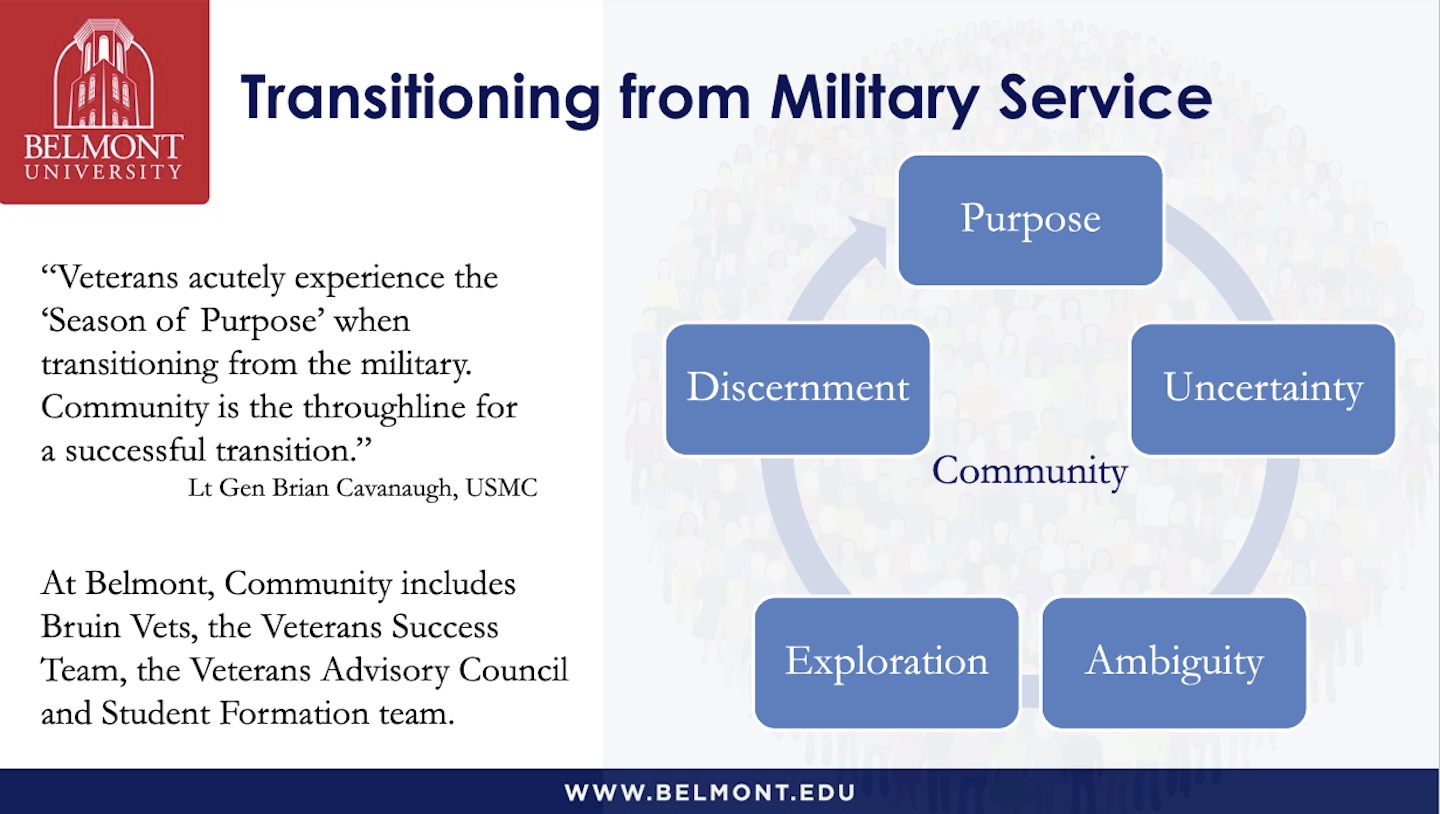Having had the great privilege of service in the US Marine Corps, leadership roles in global corporate brands like Harley-Davidson and Fender guitars, and finally arriving in academia, I have had the opportunity to witness firsthand the challenges that veterans face when transitioning from the military to civilian life. Each of my transitions posed a unique set of challenges for me, my family and my sense of self. Veteran transition is not just a set of uniforms being moved to the back of one’s closet; it’s a profound shift in identity, purpose, and perspective.
“Veterans are one our country’s greatest leadership resources,” explains Bill Carrier, President of Carrier Leadership Coaching, Inc., and Executive Director of the global leadership association 100 Coaches. Veterans have served their country with unwavering dedication, sometimes being asked to put their oath to the Constitution at the forefront of decisions that involve life and death, because what is at stake is our nation’s security. It is, as Carrier says, a “contract of duty.” However, when they exit the military, he notes that they are entering a new relationship in the civilian world —a “contract of commerce.” This transition can be jarring, as veterans grapple with understanding and articulating the value of their experiences in a vastly different context. Perhaps as importantly, they leave a highly structured role, a clear purpose, a strong sense of identity, and a deeply connected community, as they transition into a world where none of those things are guaranteed. (Shephard et. al., 2020; Becker, et. al, 2023)
To better understand this journey, we developed the framework of “Seasons of Purpose,” which encompasses a sometimes wildly non-linear journey that we all experience during periods of transition. They are (1) Purpose (2) Uncertainty (3) Ambiguity (4) Exploration (5) Discernment, and ultimately, a return to a new sense of purpose.
Season 1: Purpose
In the military, purpose is abundantly clear. Soldiers, Sailors, Airmen and Marines have served a noble cause, affirming to support and defend the Constitution of the United States against all enemies, foreign and domestic. This deep-rooted sense of duty is not extinguished when they depart the military, but if not replaced with new purpose, veterans often face a profound sense of loss. The challenge is to find a new sense of purpose that aligns with their values and aspirations.
Season 2: Uncertainty
Leaving the military often leads to a period of intense uncertainty. The big question at the start of this transition is, “What do I do?” What had been a clear role, a conspicuous purpose, and a defined path for pay and promotion can now become a much more murky road ahead. (Hammond, 2019) Recently separated Veterans begin to feel an overwhelming sense of, “I need a job!” Veterans may question their skills, their place in the civilian workforce, and whether they made the right decision. Complicating this uncertainty further is the dizzying concurrent loss of a supportive community and a connected culture. Sudden and acute isolation in the civilian world and a seismic shift in personal identity can add to the feelings of uncertainty. (Ahern, et. al., 2015, Graham, 2022) It’s crucial for veterans to recognize that uncertainty is a natural part of this journey.
Season 3: Ambiguity
Ambiguity typically follows uncertainty as veterans explore the many possibilities of employment, education, and volunteerism in the civilian world. The big question becomes, “what can I do?” Contemplating how veteran skills translate into organizational culture and “fit” is as complex a challenge as a new set of norms around dress and less . . . spicy language! Veterans must learn to decipher the structure of corporate career opportunities (Sales, Marketing, Operations, Finance, Human Capital) and quickly explore where their experiences are best suited. The sense of ambiguity is intensified by the multitude of employment possibilities depending upon location, industry, role and culture. Of note, veteran experience and skills are highly sought after in education, healthcare, non-profit, and even faith-based organizations. Further skill development and technical training are great opportunities to consider as a veteran contemplates what’s next. Keep in mind, this ambiguity can be overwhelming—but is also an incredible opportunity for personal and professional growth.
Season 4: Exploration
Exploration invites veterans to step out of the proverbial aircraft and wait for the parachute to deploy. This season brings structure and rationality to the myriad of available options. The veteran must select roles aligned to skills, interests, and strengths and explore professional possibilities in new environments. There may be starts, stops, and re-directs as new career paths are explored, educational opportunities tapped, and personal aspirations validated. Colleges and universities (undergraduate and graduate programs) can offer a supportive environment for veterans to explore new horizons, build community, reflect upon career paths that offer a new sense of purpose, and expand skills needed to thrive in the civilian world. In the season of exploration, veterans can identify and even rediscover their talents, capabilities, and passions. They can also examine the types of culture and community they wish to engage with moving into their new future, and the environment(s) in which they might most effectively have impact. (Craig & Snook, 2014)
Season 5: Discernment
As they once again seek purpose, veterans will need to make a myriad of decisions and choices about fit. Discernment is the process of carefully weighing the best possibilities and selecting a beneficial pathway forward, answering the question, “is this the right role for me?” Some choose careers with similar skills to those developed in the military (airlines, cybersecurity, logistics). Others dive into dreams deferred, skills or passions that they enjoyed prior to military service (music, teaching, non-profit work). Having role models, mentors, coaches, or informal guides during the periods of exploration and discernment can be extremely valuable. (Ahern, et. al., 2015) Regardless of the path they choose, military experience has equipped veterans with discipline, resilience, and unique leadership skills that are valuable, marketable, and transferrable.
Season 6: Purpose (rediscovered)
Returning to a new (or renewed) sense of purpose and identity often involves integrating the lessons learned in the military with newfound civilian experiences. It can be a bumpy process of synthesis where veterans recognize that their service has prepared them to make a significant impact on the world. The most important aspect of this process is that they don’t have to navigate these seasons alone. At Belmont University, the entire institution is committed to providing a welcoming and supportive community that understands the challenges veterans face and is eager to help them succeed.
Per Lieutenant General Brian Cavanaugh, USMC, “community is the through-line for a successful transition” through a veteran’s Seasons of Purpose. At Belmont, we believe in developing diverse leaders of character, wisdom, and an entrepreneurial mindset who are not only equipped to make the world a better place but also understand that we draw incredible strength from the communities where we live and serve. Veterans bring a wealth of experience, dedication, and resilience to our campus, and we are eager to provide the resources and support they need to thrive in this new chapter of their lives.
Ed Magee
Vice President for Strategic Operations
Magee is a combat veteran who holds a Master of Business Administration from the Fuqua School of Business at Duke University, a Master of Public Administration from George Mason University and a Bachelor of Science in Mathematics from the U.S. Naval Academy. He served as the Executive Vice President of Operations at Fender, a privately held musical instruments company with more than $1 billion in annual revenue. Prior to his time at Fender, Magee was a senior executive at Harley-Davidson where he oversaw production facilities and led transformational efforts throughout the organization’s workforce. In addition to his extensive career in management, Magee has served on a variety of non-profit boards. He is a Diversity MBA Magazine Top 100 Under 50 Diverse Education Leaders and a Savoy Magazine Top 100 Most Influential Blacks in Corporate America honoree. Ed also serves as an Independent Director on the Board of WD-40 (NASDAQ: WDFC) and serves on the Audit and Finance committees.
Citations
Ahern J, Worthen M, Masters J, Lippman SA, Ozer EJ, Moos R (2015) The Challenges of Afghanistan and Iraq Veterans’ Transition from Military to Civilian Life and Approaches to Reconnection. PLoS ONE 10(7): e0128599. doi:10.1371/journal.pone.012859.
Becker, K., Bish, A., McCormack, M., & Abell, D. (2023). Reconceptualizing identities: Veterans' perspectives on career transition challenges. Human Resource Development Quarterly, 34(2), 155–176. https://doi.org/10.1002/hrdq.21472
Craig, N., and Snook, S. (2014) From Purpose to Impact. Harvard Business Review
https://hbr.org/2014/05/from-purpose-to-impact
Graham, Emily. (2022). Combating Social Isolation and Loneliness Among Veterans after Separation from Military Service. Population Health Research Brief Series. 202. https://surface.syr.edu/lerner/202
Hammond, Alexandria M., "Coming Home: Veterans Leaving Service Face a Deadly Identity Crisis" (2019). CUNY Academic Works. https://academicworks.cuny.edu/gj_etds/387
Shepherd, S., Sherman, D. K., MacLean, A., & Kay, A. C. (2021). The Challenges of Military Veterans in Their Transition to the Workplace: A Call for Integrating Basic and Applied Psychological Science. Perspectives on Psychological Science, 16(3), 590-613. https://doi.org/10.1177/1745691620953096
The Seasons of Purpose Framework was developed by Ed Magee and Joe Mankowski at Belmont University and incorporated input from Lieutenant General Brian W. Cavanaugh, USMC, Commanding General, Fleet Marine Force, Atlantic; Commander, Marine Forces Command; and Commander, Marine Forces Northern Command, Colonel Heather L. Maki, US Special Operations Command CIG, Bill Carrier, and Dr. Jim McIntyre.


